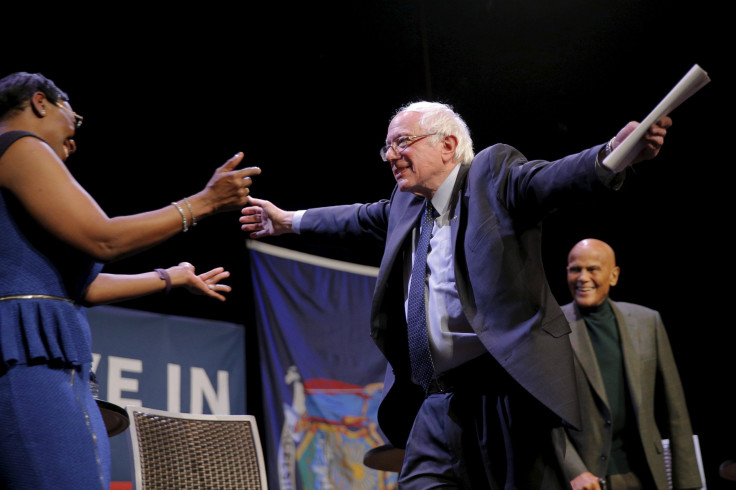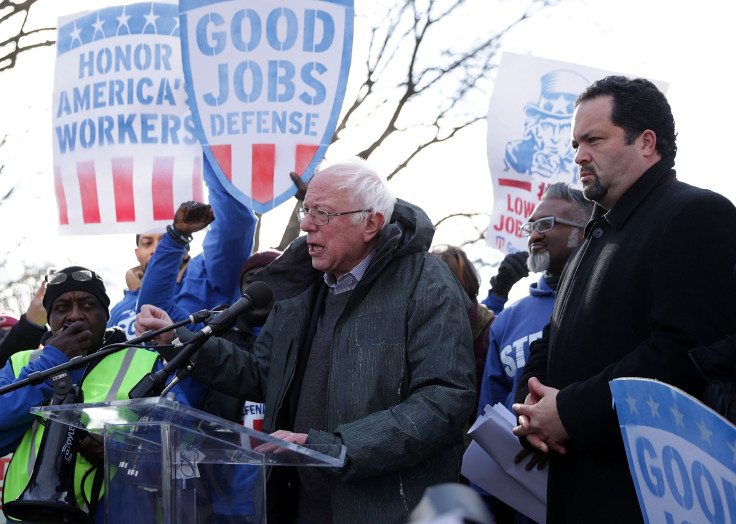Bernie Sanders Courts Black Allies In The South, Ahead Of Possible 2020 Run

In advance of a possible 2020 White House run, Bernie Sanders seems determined to fix a problem that may have cost him the 2016 Democratic nomination: his poor performance in the South. The Vermont senator and the nonprofit organization he inspired are deploying resources in support of progressive African-American candidates in key races in the South, potentially building the infrastructure he’d need in a second presidential bid.
Sanders or the Sanders-backed nonprofit Our Revolution have endorsed black, progressive candidates in three mayoral elections, and two have already had victories this year: Chokwe Antar Lumumba won in Jackson, Mississippi, and Randall Woodfin won in Birmingham, Alabama. A third Southern leftist, the experienced Georgia state senator Vincent Fort, is running for mayor of Atlanta with Sanders’ personal endorsement.
Sanders and his allies have committed to backing progressive candidates around the country as part of an effort to fuel a populist, grassroots movement in American politics. But creating a stronger presence in the South could also be a shrewd calculation designed to improve his chances of winning the Democratic nomination.
“I don’t know what the specific strategy is, but if it was a strategy it’d be a very smart strategy,” Fort told International Business Times. “It may be strategic, but it’s larger than that, because in 2015 and 2016 during the presidential campaign, [Sanders] talked about the need to organize grassroots progressivism in the Democratic Party.”
Hillary Clinton walloped Sanders in the South last year, taking every Southern state except for West Virginia, often with huge margins of victory. She won Alabama by 59 percent; Georgia by 43 percent; Mississippi by 66 percent; and South Carolina by 48 percent. Had Sanders lost by smaller margins, he would have been in a much stronger position to clinch the nomination.
Part of Clinton’s strong showing had to do with her and her husband’s decades-long relationship with Southern African Americans, said Mark Longabaugh, whose political media company worked with the Sanders’ 2016 campaign. Before his presidency, Bill Clinton served five terms as governor of Arkansas.
“I think it’s significant, despite the fact that Bernie Sanders didn’t do as well as we’d like, that [his performance in the region] was in part due to the relationship that the Clintons had with the South over three decades,” Longabaugh told IBT. “Clinton had a level of familiarity and support there that was unique to that particular race.”
Regardless of the causes, Sanders would need to significantly boost his following in the South to win the Democratic nomination in 2020.
Lumumba, a 34-year-old whose father was previously mayor, won the mayoral race in Jackson, the biggest city in Mississippi, on a radical, leftist platform. Days after his early June win, he said, “So we've made the decision that we're going to be the most radical city on the planet.” Our Revolution endorsed the young candidate and sent hundreds of text messages to Jackson voters.
“Young African-American progressives are showing that you can run a race and be a strong progressive, and people will respond,” Nina Turner, president of Our Revolution and a former Ohio state senator, told IBT. “It works well whether you’re in Jackson, Birmingham, and we hope in Atlanta.”
Woodfin, age 36, beat the incumbent mayor, a long-time Birmingham politician, with 58 percent of the vote in Alabama’s biggest city. Not as far left as someone like Lumumba, Woodfin supported Clinton in the 2016 election and was her Alabama campaign chair, but both Our Revolution and Sanders endorsed him this year. Our Revolution provided over 70 volunteers to Woodfin’s campaign and sent nearly 12,000 get-out-the-vote text messages in the general election as well as about 8,000 in the primary. Sanders recorded a robocall supporting Woodfin.
Bakari Sellers, a 33-year-old African-American former state senator in South Carolina, also supported Clinton last year. Now a lawyer and a CNN commentator, Sellers traveled to Birmingham to campaign for Woodfin alongside Turner.
“People think the divide of Sanders and Clinton has a lasting effect, but it doesn’t,” Sellers told IBT. “I hope to be on the same team with Nina Turner and Justin Bamberg.”
Bamberg, another young, black progressive, holds the South Carolina state senate seat from which Sellers resigned in 2014 and was endorsed by Our Revolution in his 2016 race.
“I’m not trying to relitigate 2016. I’m trying to make sure progressive candidates win throughout the south,” said Sellers.
Georgia state Sen. Fort earned an endorsement from Our Revolution and Sanders himself. Fort is an experienced state politician and a proven progressive who is running in the Atlanta mayor’s race, with an election on November 7 and a potential run-off on December 5. Sanders spoke at a large Fort rally in Atlanta on September 30. The Sanders endorsement was important, said Fort.
“I was glad to get his endorsement, and I think it’s been instrumental in sending a message to people as to who the true progressive is,” he told IBT.
Our Revolution has raised more than $130,000 for Fort so far, and, according to Fort, the Our Revolution Georgia chapter has made telephone calls and canvassed for him.
Fort endorsed Sanders shortly before the 2016 Georgia primary and said he “caught heat for it,” as “the Democratic Party establishment didn’t like that.” He was a Sanders delegate to the 2016 Democratic National Convention and co-chair of the Sanders’ delegation from Georgia. Now Fort is running what he calls “an insurgent campaign.” Sounding like the 2016 Sanders, Fort said it’s “more of a movement than a campaign.
“The establishment is very concerned with where we are,” he said.
“Atlanta is a bigger city than either Birmingham or Jackson, so the stakes are much higher and intense here,” said Fort. “If we can win in Atlanta, it sends a message that the cradle of civil rights movement — the home of Dr. Martin Luther King — is a growing part of the progressive movement.”

In addition to the three mayoral campaigns, Our Revolution and Sanders have endorsed former NAACP President Ben Jealous in his 2018 bid for governor of Maryland, a state which Sanders lost by 30 points to Clinton last year. Jealous was an outspoken Sanders ally in the 2016 race and a founding board member of Our Revolution, although he resigned before announcing his candidacy.
The Maryland election will be “one of our premier races” in 2018, said Turner. “We’re going to continue to push like we always do...Call into Maryland, do our text message program, and galvanize volunteers.”
Turner said Our Revolution is in conversation with the NAACP. “We have good relationship with the NAACP, but I want to cement it.” Our Revolution is working to “form partnerships with [other] African-American-led groups” including the civil rights organization National Urban League, she said.
Our Revolution also endorsed Black Lives Matter organizer and democratic socialist khalid kamau, who won a seat on Georgia’s South Fulton City Council in April, and South Carolina state Sen. Terry Alexander, who endorsed Sanders in 2015.
Sanders hasn’t announced that he’ll run for president in 2020, but his 2016 campaign manager Jeff Weaver says it’s a possibility.
“He’s kept the door open; he has not closed it or opened it,” Weaver told IBT. “It’s too early for that discussion yet.”
In addition to building networks in states where he didn’t do well in 2016, Sanders — as the outreach coordinator for Senate Democrats, appointed by Senate Majority Leader Chuck Schumer — has been traveling the country and organizing dozens of rallies on health care and, most recently, his free college plan. Starting in early 2017, Sanders relentlessly toured the nation and held numerous events to organize opposition to Republicans’ Affordable Care Act repeal attempts. As those GOP efforts died down, at least temporarily, Sanders began to promote his Medicare-for-all bill, which he introduced in September with 16 Senate co-sponsors.
With much-improved name recognition, and having already built a large and faithful following in many states, Sanders could be well positioned for another presidential run. Longabaugh told IBT that he didn’t know if Sanders is planning to run but said, “I think if Bernie Sanders decides to run in 2020 he’ll be a very formidable candidate. He’s the only Democratic candidate that starts with a 50-state organization and a proven record of being able to raise $225M for a national campaign. More specifically, he has the sharpest, specific message, which he delivered in 2016 and over the course of last nine months in the Senate.”
Sanders remains the most popular active, high-profile politician in the country. An August Harvard-Harris online poll found that 54 percent of Americans view Sanders favorably, and an earlier Harvard-Harris poll showed that among Democrats, the senator is extremely well-liked. As of April, 80 percent of Democrats held favorable views of Sanders, as well as 73 percent of African Americans and 68 percent of Hispanics.
“I believe he is considering [a run],” Fort told IBT. “I would like him to.”
© Copyright IBTimes 2024. All rights reserved.






















